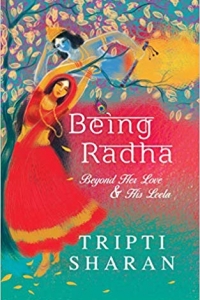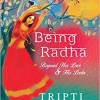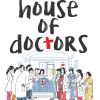
Myth or Reality?
The boundaries between these two gets blurred in a world that believes in logic and evidence. It is only ‘faith’ that restores definition and clarity. While
reality can never be tampered with, myth allows one the freedom of interpretation.
I have always been fascinated by mythology and romance and grew up binging on both these genres. Out of many, I found Radha-Krishna unique. Their story is
neither the typical love story nor is it the kind you come across in mythology.
Female protagonists in Indian mythology are full of intrigue. Despite the different roles assigned to them such as power, knowledge and wealth they are ultimately
presented as creators of the world, as mothers, a role in which they are worshipped.
But Radha presents a very different facet of womanhood. She is the Balsakhi, who plays with God. She sings and dances with God and adorns herself to look beautiful
to him. She is torn by jealousy, fights with him and then makes up passionately. She sneaks discreetly from her home to meet him. She is the lover, never the wife
or the mother. Radha-Krishna’s union is not socially acceptable yet they have always been worshipped in the temples. This got me thinking. Did their union have a different meta-physical meaning?
I started reading up literature on Radha.
None of the major texts like Ramayan, Mahabharat, or Bhagavad Gita spoke of Radha. Though she is mentioned in many different smaller texts, the descriptions of her
and the events in her life are highly conflicting. We see her recognition in the 12th century text, Gita Govinda by Jayadeva. She is described in glorious terms in the book
which envisions Krishna as an eternal lover, madly and forever in love with Radha, who reciprocates his love in equal measure. It stormed the imagination of people in
those times and Radha-Krishna became the much adored and revered divine couple.
Not much is known about what happens to Radha, after Krishna leaves for Mathura. There is again a wide discrepancy in the different narrations. In all probability,
her role in his life was over as Krishna focused his energies in the other far more important events that occupy his life, thence.
But, through all the metaphors and variations, what strikes one is the story of a simple village girl who steals the heart of God. And the more I read, the more I began
to admire Radha.
Older and betrothed to someone else, she chose to defy societal norms and love another man, display her love openly yet later gave him up easily. Was she fighting
stereotypes, even at that time?
Certain questions emerged—did she never miss him or want him to come back? How could she love someone with such intensity and then let go, so easily?
Did they ever meet after that or did she continue waiting, eternally?
I wondered what was it like to be a God’s beloved; what was it like to be a woman accorded the status of divinity yet understood poorly?
I, a woman living in the 21st century struggled to understand Radha and her predicament and took the liberty of choosing my own narration, telling the story of a woman who symbolises love and longing, which is otherwise brushed over in spiritual texts.
The book explores the protagonist Radha, as she narrates her life story sharing with us her journey. At places she comes across as a philosopher, at places a poet; at places a woman deeply in love, pining, craving his attention; at places she is his friend reprimanding him for his many adventures; and later as a woman holding on to his love even as he leaves for Mathura. The book also talks of her marriage to Ayan and the life she leads after Krishna’s departure from Vrindavan.
The verses are at places metaphorical and at places subtle. But they allow the reader freedom of interpretation—you can read it as a love story of an eternal couple, or as the union of devotion with divinity.
A seemingly simple story, yet each poem displays Radha’s attempts to analyse, comprehend and come to terms with her reality. Many of the poems pose questions
to Krishna as well. Like when she broods:
In the battlefield
As you teach them
The path of dharma
Will you ever look back
At your own karma?
There are many unanswered questions leaving gaps in our understanding. But Radha’s story still remains contemporary, fascinating and enthralling. The book is an attempt to explore the enigma that is Being Radha, beyond Her Love and His Leela.
Radhe-Radhe
Prologue
'Radha—a myth
Crafted by artful wordsmiths?
A saga of epic scale,
Or an elementary folktale?
Is Her story
A mystery
Awaiting recovery?
Were Radha-Krishna
One and the same?
Or was this
Just another name?'
She turned her head slowly,
Her face lined
With a thousand memories,
Etched—crisscross
A plethora of battles,
Fought and lost.
Yet her almond eyes
Burned bright,
Like a coal blaze
On a stormy night
'Radha-Krishna,
Just another story
Of unrequited love?
An unforgiving saga
Of caste and creed,
Lust and deceit?
‘Was she fiction,
Just a perception?’
She raised her shocked eyes
No tears, no pain
Just a headshake
Of sharp disdain
‘Radha-Krishna, were one!’
She whispered, strongly.
‘But he left her,
They never married.’
‘You don’t marry yourself!
He was God
He never left anyone.
She, his divine soul
Wasn’t left behind,
By anyone.’
‘He never returned!’
‘It was his breath, that he left behind!’
From her hands daintily painted
She held up with reverence
A flute, of enduring permanence
‘His life was for a purpose,
But bereft of his soul
His body lived
But not he.
He charmed everyone.
But he never played again.
He lived,
A life devoid of music
For, she was his song.’
‘To be abandoned,
Was that not love’s most
Painful deception?’
‘She was his best friend, his soul
Across ages,
She waited to become whole.’
‘How would you know?’
‘Don’t you know too?
Isn’t it Krishna, that you seek,
Just like me?
Isn’t his name, on your lips too?
We all pay for our karmas
Even gods do.’
‘Will you tell me her story?’
‘Radha’s story?
She talks to “her” Krishna daily.’
Lovingly,
She looked at the flute
And I struggled to hold
The verses,
That began to flow. . .
About the Author







Comments